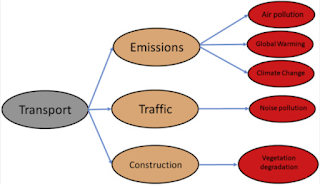Intelligent geo-sensing for moving toward smart, resilient, low emission, and less carbon transport
Transportation has a prominent role in sustainable economic development programs and increasing the level of social welfare. It has been even considered as the backbone of economy/development; over 16 million employees were working in the freight transport of the European Union countries in 2018, for example. In contrast, transport is one of the leading global sources of climate change and global warming; it is contributed to over 62% of global greenhouse gas emissions.
The inefficiency of the transportation system will lead to serious environmental degradation, e.g., air pollution, and negative social and economic consequences, thereby transportation-related challenges such as congestion, road safety, vehicular emissions, etc., have been ranked as the major troubles of human societies.
The current advancements in geo-sensing, smart algorithms, cloud computing, data science, and processing technologies could somehow and somewhat address some of those serious challenges. For example, the intelligent transportation systems could significantly enjoy intelligent geo-sensing technologies and artificial intelligence algorithms to optimize traffic management. These state-of-the-art packages could support new technologies and services such as the Internet of Things, eco-driving/routing, signalized intersections, etc., which can reduce to some extent fuel consumption and on-road emissions.
This study by Ghaffarpasand and colleagues provides a summary of the contribution of transportation to civilization, development, economy, and environmental degradation. It reviews the role of intelligent geo-sensing technologies in moving toward sustainable, active, and green transport. It concludes by explaining that exiting or due geodata science/technologies could somehow address the environmental drawbacks of the transportations and can be considered as a promising solution for the challenges ahead.
This study was published as a chapter in the book, titled, 'Artificial Intelligence and Data Science in Environmental Sensing,' in 2022.
Powered by Blogger.

Platform anthropocene Inc. or planthro is a New York
registered, globally active, not-for-profit public charity organization.
planthro targets scientists, students, citizens, governing
bodies, entrepreneurs and stakeholders concerned with the
concept of anthropocene and its multiple implications.
The organization aims at:
● conveying and sharing a lucid view of the complexity
characterizing human interaction with Earth,
● empowering individuals and organisations to work
collaboratively in economic, social, environmental, and
governance contexts,
● supporting and promoting informed and creative solutions
on sustainability, mitigation and adaptive strategies.
Find out more...
What do you think?
Have a comment, need more information, found an error, copyright claims, found a broken link, want to get involved, want to suggest a reference...
Write a comment on this page on this reference or get in touch with the project through the contact form on the corporate page www.planthro.org








No comments:
Post a Comment